January/February 2020
Dear Friends,
We hope that your year is off to a great start. We spent the beginning of our year interviewing nearly 200 candidates for the 2020-21 cohort of Fellows. We were inspired by the impressive candidates we met and are looking forward to placing them with our host organizations. We were also excited to spend time with our alumni, board members and other members of the PiAf family who joined us for the interviews. Thank you very much for all your hard work. Our highly anticipated 2018-2019 Annual Report is now available. You can read a digital copy on our website or get a physical copy from our office.
Here at the office, we are finalizing preparations for our midyear Leadership Retreat that will be held in Moshi, Tanzania in early March as well as our site visits to Ghana, Kenya, Tanzania, Uganda, Rwanda, and Madagascar. Follow us on our social media over the next few weeks to see highlights of our Leadership Retreat and we hope that you enjoy this Fellows Flyer edition!
PiAf Connections
Please click below to check out pictures of our Fellows, Alums and other members of the PiAf family meeting up at home and around Africa.
Notes from the Field
By Samantha Archie, '19-'20 Fellow with the International Rescue Committee in Sierra Leone
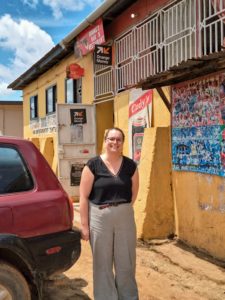
Samantha at Obama’s (her favorite local restaurant in her field posting in Bo, Sierra Leone)
As I approach the halfway point in my fellowship, I’ve spent some time reflecting on my first six months here. I think back to that girl who came here in July. Excited to dive head first into a new job, but pretty unsure of what she was getting into. Never in my wildest dreams could I have imagined doing what I’ve done or learning all that I’ve learned over the past six months.
My job as a Research and Grants Fellow has proven to be one of the most challenging and rewarding experiences I’ve had in my life. I’ve been able to lead the design and implementation of a qualitative research project on decision making and its relationship to teenage pregnancy in Bo, Sierra Leone. I am currently working side-by-side with my Sierra Leonean colleagues to conduct the analysis of the data we’ve collected, teaching them some qualitative data analysis skills, while simultaneously learning more from them about the context to improve our analysis. I recently presented some preliminary findings to colleagues from other international NGOs at an action research workshop. The thing I am most excited about is sharing the findings with the entire program team, so that we can use those findings to come up with a new program adaptation to help make our existing programming more effective.
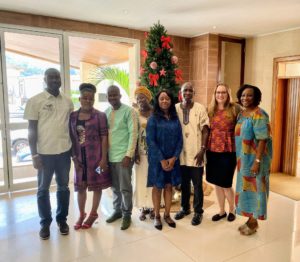
Samantha and the Adolescent Girls Empowerment and Protection Project (AGEPP) Research Team at the Action Research Workshop
When I was deciding to accept the offer with Princeton in Africa, I focused on how this opportunity would help me build my professional skills and further my career aspirations, and it has definitely done that. But as I look back on the past six months, while I’m super proud of my professional achievements thus far, I am even more proud of the personal growth I’ve achieved. I’ve learned to identify and address challenges quickly and preemptively. I am a much better communicator with my colleagues and myself. I better understand my strengths and weaknesses and can more quickly identify when I need to ask for help and am actually asking for that help. These achievements also extend beyond work. I am a more confident person. I am much more compassionate toward myself. I am more intentional about my words and actions. I am more goal-oriented. I spend more time cultivating and maintaining relationships, and have been rewarded with some incredibly meaningful relationships both here and back in the US.
All in all, if these next six months are anything like the last, I’m in for a real treat here in Swit Salone.
Notes from the Field
By Leah Dunlevy, '19-'20 Fellow with the Rwanda School Project in Rwanda
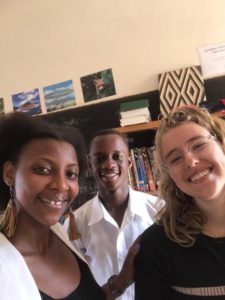
Leah pictured in the library with Ornella, the school’s librarian and Damascene, a 2018 RLS graduate and 2019 work study fellow.
Hello from Rwamagana, Rwanda! My name is Leah Dunlevy, and I have been working as the Princeton in Africa fellow at Rwamagana Leaders’ School since August. Rwamagana Leaders’ School (previously, Rwamagana Lutheran School), is a secondary school based on the principles of student focused expeditionary learning, environmental sustainability, and social change.
My work at the school varies from day to day, but I will try my best to take you through a typical day of work at the school. Each morning I walk roughly 30 minutes from my home to the school. The beauty of Rwanda’s rolling hills honestly never gets old, and I am often able to catch the sunset on my way home.
At the school, my “office” is based in the school’s library. It’s a great place to sit and do work, and people are constantly coming in and out to study, read, and relax, which allows me to interact with many of the school’s students.
I am in charge of general environmental programming, which includes the development of a new environmental studies curriculum, running the environmental club, and working on other environmental initiatives such as transitioning the school to a more sustainable trash management program. During my time at the school, I have already learned so much about various environmental systems already in place including rainwater collection, farm to table eating, and solar energy.
When I’m not working on environmental programming, I am often assisting students with the college application process. I run the Weekly Accelerated Study Program, during which time the students and I cover topics related to life after high school, including standardized test prep, interviewing skills, and essay writing.
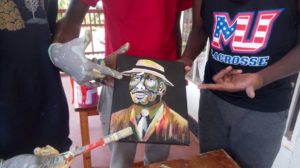
A painting by students from the art club at RLS
For fun, I started a Spanish club at the school, assist with the media club (I have a degree in journalism), and enjoy watching the many sports competitions at the school.
During the day, I spend most of my time creating lesson plans for environmental programming and the weekly clubs that I am involved in or working one on one with students to edit college essays or improve their English skills. Most days after school, I stick around to run or attend student clubs!
I am incredibly excited to continue working with the staff at RLS to strengthen environmental initiatives at the school, assist the next class of senior six students in their college applications, and strengthen a variety of club programming.
Notes from the Field
By Amy Jung, '19-'20 Fellow with Young 1ove in Botswana
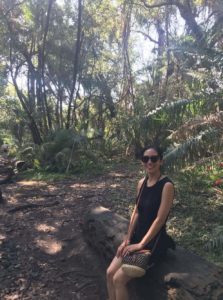
Amy spending a day relaxing at Victoria Falls in Zimbabwe.
Hello from Gaborone! My name is Amy working for Young 1ove Organization’s research department. It has been an exciting few months filled with learning. Since my time here, I’ve learned a lot about Monitoring and Evaluation (M&E). Young 1ove has taught me the importance of evidence-based actions and what good-evidence could achieve.
Before the fellowship, I used to think M&E entailed crunching numbers and spending days in front of a computer. To my surprise, I learned that it is much more than just numbers. As a research fellow, my day at work involves going to the field to ensure good quality data is collected, preparing focus groups to get feedback on tools, coordinating with other departments to optimize data flows and much more. Some days are spent in front of the computer crunching numbers, cleaning data, or programming surveys. I enjoy that every day looks different than the other and that I learn something different each day. One of my favorite moments has been training facilitators on a tool that I designed and programmed, and seeing the tool be used on the field and receiving data that I planned for. Now I am building a database using the data the facilitators collected using my tool. It was rewarding to see the end product come to life and to see the full cycle of this small project.
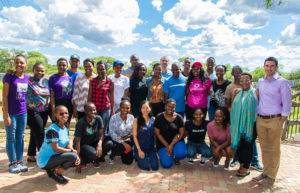
Amy with her fellow Young 1ove staff members during the December staff retreat.
During the highs and lows throughout the fellowship, the learning journey keeps me grounded and focused. The insights I get at the end of each day and the knowledge I will accumulate by the end of the fellowship motivate me to keep working hard. What I appreciate the most at Young 1ove is the commitment to good-evidence and evidence-based actions. The rigor and dedication to high-quality data and evidence are the foundation of Young 1ove, and it inspires me to carry this principle anywhere I go after this fellowship. I feel blessed to have started my career in M&E here at Young 1ove.




